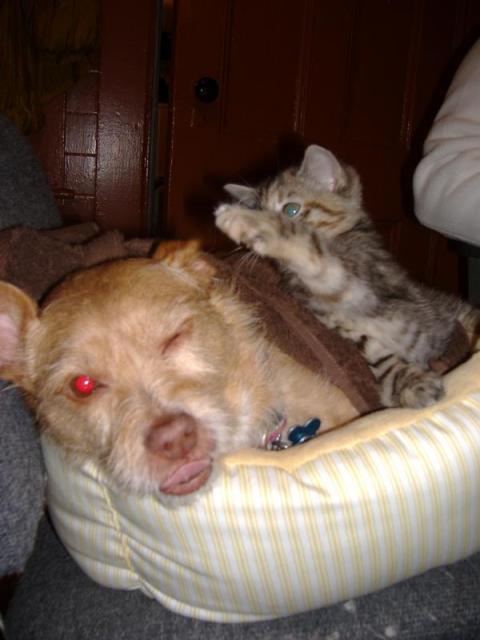QuestionQUESTION: We recently bought an Australian Cattle Dog pup from an established breeder. We viewed parents prior to buying and saw no evidence of this behaviour.
Our pup is now 5 months old and incessantly chases his own tail. When he actually catches it he bites down hard and is biting the end of his tail. We have had him to the vet who has given us medication to help him calm down but it has made little difference.
We have limited his structured exercise because of his age but have recently begun running him around the property. This has not seemed to make a difference as he still chases when we get back.
What causes this type of behaviour? He also barks madly at a piece of pipe is his yard and also the handle of a rake. He has two other dogs to play with, one 1 month younger and the other a 13 year old.
From the day we collected him he has always panted a lot. He still does but it hard to tell whether this is stress panting or from the exertion of lunging after his tail. At this point we are debating whether we can keep him as it is awful to watch him spin. Do dogs grow out of this type of behaviour or is it a life long condition?
ANSWER: This can be an obsessive/compulsive, self rewarding behavior that has developed out of boredom and/or anxiety. It can also be the result of low level seizure disorder. If seizure related, calming medication doesn't address it. Some discussion of this is found here:
http://www.btneuro.org/tailchasing.htm
You need to consult a veterinary behaviorist. Such expert is able to evaluate your dog's temperament, interview you at length regarding all aspects of his behavior, and do a base line neurological evaluation. The panting, itself, is either the result of stress in the environment or internal anxiety. The veterinary behaviorist is equipped to evaluate all causes.
You can find one from one of the following sites. If not, call the veterinary school in your geographical area for referral. You may have to travel but it's well worth it. The dog is definitely demonstrating a high level of stress and there appears to be some cognitive deficiency. You can't afford to ignore it. Here are sites you can find a veterinary behaviorist:
http://www.veterinarybehaviorists.org/
http://www.avsabonline.org/avsabonline/
MEANWHILE: put this dog on house tab (leash with handle cut off). Leash restraint is experienced as not just physical, but also psychological restraint by dogs. Every time he begins tail chasing, pick up the leash and settle him down or redirect him to a "sit", heavily food reward (juicy tidbit) and wait for him to calm.
---------- FOLLOW-UP ----------
QUESTION: Thanks for your response.
We have gone through and read the pups pedigree which only just recently arrived and we noticed that the father of the pup also fathered the mother of the pup, therefore his father is also his grandfather. Does this type of inbreeding affect the litters? Could this have contributed to this neurological disorder?
AnswerThis is called a "line breeding" BY A REPUTABLE BREEDER. Father/daughter etc. breedings are done to bring out certain aspects of "type" and the progeny of such a breeding must either be spayed/neutered or go into homes where five generation pedigree MUST be CLOSELY examined to rule out ANY breeding BACK into that line. Inherited conditions and characteristics are more likely to show up with inbreeding. This can be a good thing or highly detrimental. If the dogs are carrying genetic faults and/or genetic diseases, these may appear in the progeny if the dogs are mated to close relatives. THere is less chance of them appearing if the animals are not mated to close relatives. This is of course a two - edged sword.
There does appear to be an inherited problem with seizure disorders in Australian Cattle Dogs, sufficient enough for several sites that mention it. If your veterinary behaviorist determines the tail spinning is seizure related (and it does seem to me that it is), phenobarbital can be given but regular blood tests MUST be done to evaluate the effect of medication on liver function.

 Very Scared Dog
Question
Happy
My dog is 17 months old and is a mixed b
Very Scared Dog
Question
Happy
My dog is 17 months old and is a mixed b
 American Bulldog aggression
Question
Buddy and Rez
I have a 2 year old Ameri
American Bulldog aggression
Question
Buddy and Rez
I have a 2 year old Ameri
 My dog is shaking and hiding under my bed recently
QuestionRorrie and Pencil
QUESTION: My dog, Rorr
My dog is shaking and hiding under my bed recently
QuestionRorrie and Pencil
QUESTION: My dog, Rorr
 Black lab - 1 yr
QuestionSheba
QUESTION: My lab loves to bite her
Black lab - 1 yr
QuestionSheba
QUESTION: My lab loves to bite her
 Is this aggression, dominance, or play?
QuestionQUESTION: I have a question regarding doggy beh
Is this aggression, dominance, or play?
QuestionQUESTION: I have a question regarding doggy beh